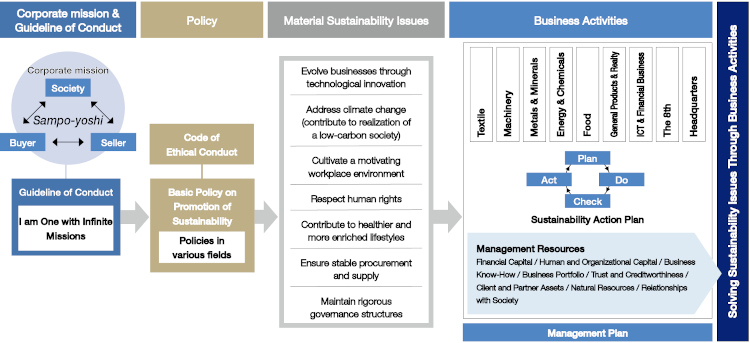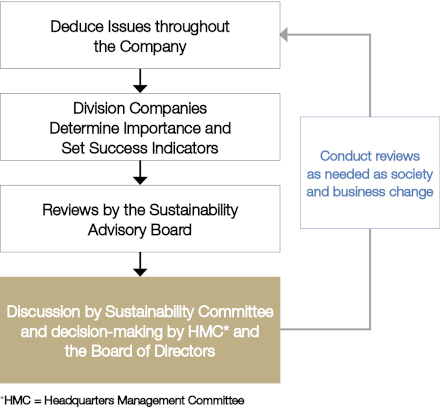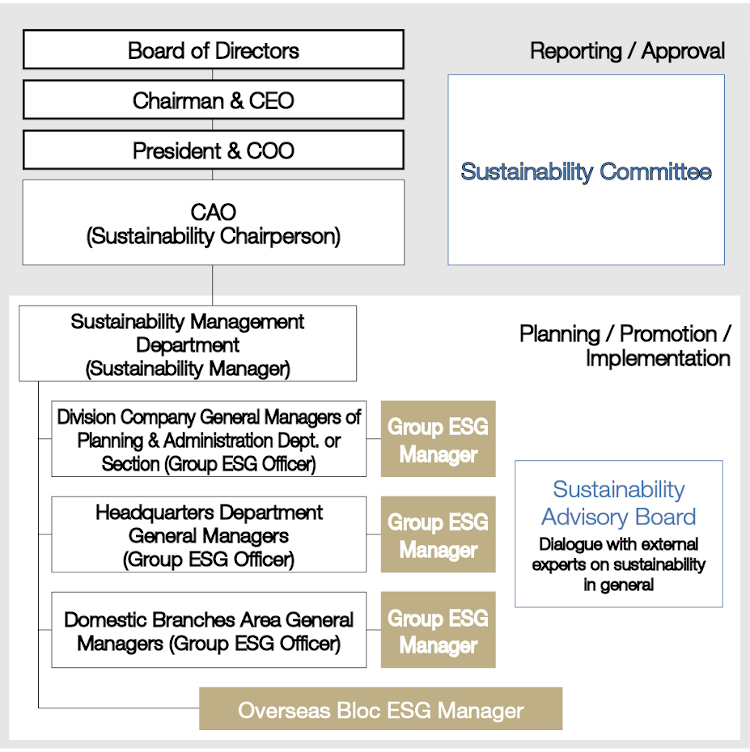Sustainability Initiatives for Sustained Corporate Value Creation
ITOCHU conducts business globally under the Group corporate mission of “Sampo-yoshi,” our founding spirit. As such, we consider addressing global environmental and social issues to be one of the top priority issues in our management policy. We contribute to the realization of a sustainable society in order to achieve the goals of the Group Guideline of Conduct, “I am One with Infinite Missions.”
We have established the Basic Policy on Promotion of Sustainability in accordance with our corporate mission and the dynamic environment in which we operate, and promote initiatives in an organized and systematic manner. We have also determined our material issues, which are priority issues that we should resolve, and incorporated these into our Sustainability Action Plans. While maintaining and increasing our earning power, we will achieve both a sustainable increase in corporate value and resolving social issues through our trade and business investment activities.
Sustainability Promotion Flow

Identification and Review of Material Issues
Since ITOCHU first identified material issues in 2013, we have conducted regular reviews based on trends in the international community and the expectations of stakeholders. In FYE 2019, when the previous medium term management plan kicked off, we identified seven material issues based on the adoption of the SDGs, the Paris Agreement on climate change coming into effect, and other social developments and changes affecting business. In the FYE 2021 Management Plan, we continue to apply them.

Sustainability Promotion Framework
The Sustainability Management Department plans measures to advance sustainability. After these are decided by the CAO, they are carried out by each organization. The Sustainability Committee deliberates and makes decisions concerning formulation and revision of basic policies and important matters. Through dialogue with stakeholders such as the Advisory Board, we gain an understanding of society’s expectations and demands, etc., which we use in our efforts to promote sustainability.

Scroll
| Material Sustainability Issues | Examples of Performance Indicators for Sustainability Action Plan | Status of Initiatives at Division Companies | SDGs | ||||||||
|---|---|---|---|---|---|---|---|---|---|---|---|
| Textile | Machinery | Metals & Minerals | Energy & Chemicals | Food | General Products & Reality | ICT & Financial Business | The 8th | Headquarters | |||
|
Evolve businesses through technological innovation We create new value by working on new technologies proactively and trying to respond to changes in the industry structure beyond the framework of existing businesses. |
• Rebuild business through the application of AI, IoT, fintech, and other new technologies and services• Through the use of AI and the popularization and expansion of RFID tags in the textile business, realize higher levels of supply chain productivity and operating efficiency, better traceability, and enhanced selling capabilities |
![[icon 1]](img/an16_ic01.jpg)
|
|||||||||
|
Address climate change (contribute to realization of a low carbon society) We strive to adapt to the impact of climate change on business. At the same time, we work to promote business activities aimed at contributing to realization of a low carbon society and reduce GHG emissions. |
• Develop an optimal asset portfolio that takes social requirements fully into consideration, including the transition to a low carbon society• Promote initiatives aimed at increasing the renewable energy ratio of our power generation business more than 20% (equity interest basis) by FYE 2031 |
![[icon 2]](img/an16_ic02.jpg)
![[icon 3]](img/an16_ic03.jpg)
|
|||||||||
|
Cultivate a motivating workplace environment We create an environment that enables each employee to fully demonstrate their capabilities with pride and motivation by taking advantage of diversity. |
• Comply with societal and environmental maintenance and management standards throughout the entire Group’s supply chain• Announce a policy for sustainable palm oil procurement that takes into account business partners’ conditions, industry trends, and liaison with industry groups, and promote building of a structure for procurement and supply |
![[icon 4]](img/an16_ic04.jpg)
![[icon 5]](img/an16_ic05.jpg)
![[icon 6]](img/an16_ic06.jpg)
|
|||||||||
|
Respect human rights We take initiatives for the respect and consideration for human rights through our business activities to stabilize our businesses and contribute to the development of local communities. |
•Comply with societal and environmental maintenance and management standards throughout the entire Group’s supply chain• Announce a policy for palm oil procurement that takes into account business partners’ conditions and industry trends and liaison with industry groups, and promote building of a structure for procurement and supply |
![[icon 7]](img/an16_ic07.jpg)
![[icon 5]](img/an16_ic05.jpg)
![[icon 8]](img/an16_ic08.jpg)
|
|||||||||
|
Contribute to healthier and more enriched lifestyles We contribute to realizing a healthy, rich life, aiming to improve the quality of life of all people. |
• Ensure food safety and security through establishment of the Food Safety Management Department• By FYE 2021, aim to manage the health data of 1 million people obtained from medical checkups |
![[icon 9]](img/an16_ic09.jpg)
![[icon 1]](img/an16_ic01.jpg)
![[icon 10]](img/an16_ic10.jpg)
|
|||||||||
|
Ensure stable procurement and supply We work to ensure the effective utilization and stable procurement and supply of resources in accordance with demand in each country, in consideration of biodiversity and other environmental issues, aiming to achieve a recycling oriented society. |
• Further promote the recycled fiber business and increase our handling of sustainable materials• By FYE 2026, make 100% of the wood we handle in the wood products business either certified wood or wood that is confirmed to be under a high level management |
![[icon 7]](img/an16_ic07.jpg)
![[icon 10]](img/an16_ic10.jpg)
![[icon 11]](img/an16_ic11.jpg)
![[icon 12]](img/an16_ic12.jpg)
|
|||||||||
|
Maintain rigorous governance structures The Board of Directors implements highly effective supervision of management from an independent and objective standpoint and ensures appropriate and efficient execution of operations by improving the transparency of decision making. |
• Continuously conduct measures aimed at strengthening the supervisory function of the Board of Directors through Board of Directors’ evaluations• Monitor various compliance related measures and continue face to face training, etc. |
![[icon 13]](img/an16_ic13.jpg)
|
|||||||||
